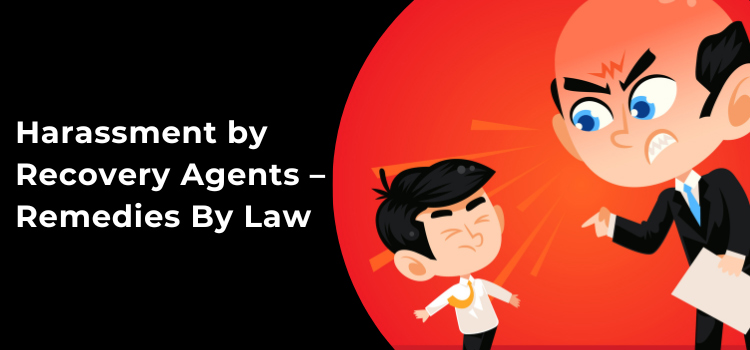Harassment by Recovery Agents – Remedies By Law
Posted On : June 20, 2023

Table of Contents
Introduction
In India, the use of recovery agents or debt collectors by financial institutions to recover outstanding dues has become a common practice. While recovery agents play a crucial role in the debt recovery process, there have been instances where their methods have crossed the line into harassment. Harassment by recovery agents is a serious issue that can cause immense distress and anxiety for individuals. However, Indian law provides remedies to protect consumers from such misconduct and ensure fair and just debt collection practices.
What Is Recovery Agent Harassment?
When debt collection agencies employ aggressive and illegal methods to pursue unpaid debts from people, this is referred to as recovery agency harassment. It involves actions like making frequent, threatening phone calls, using foul language, harassing family members or coworkers, feigning impending legal action or arrest, or going uninvited to the debtor's home or place of business.
The Regulation and Supervision of Recovery Agents
To regulate the activities of recovery agents, the Reserve Bank of India (RBI) issued guidelines in 2007, which were later updated in 2017. These guidelines outline the code of conduct that recovery agents must adhere to while dealing with customers. The RBI guidelines emphasize the importance of fair treatment, professionalism, and respect for customer rights during the debt collection process.
-
Agents cannot infringe upon your privacy.
A recovery agent is not permitted to infringe upon your personal space, as per RBI regulations. In other words, the third party is not permitted to talk about the loan with your coworkers, friends, or family. You have the right to sue the recovery agent in the event that he does this.
-
Agents must identify themselves
When the recovery agency shows up to collect the money, you must confirm their identity. As a representative of the bank, the bank issues each agent with an official identification card. Ensure that they do not decline to reveal their identify. Call the bank or the police right away if they object.
-
Recovery specialists must refrain from using foul language.
Recovery specialists must adhere to a few rules. In order to collect money from the borrower on behalf of banks, for instance, recovery agents are not permitted to use harsh language. They must also treat every client with respect, even though they are trying to collect past-due amounts.
-
Agents can't get in touch with you during odd hours
A recovery representative may call you from 7 am to 7 pm in accordance with RBI regulations. Prior to or following 7 o'clock in the morning, they have no authority to contact you.
If you work in shifts, you may also request a later call from the recovery person by giving them a suitable time. They cannot, however, compel consumers to speak at an inconvenient hour.
Prohibited Practices by RBI for Recovery Agents
The RBI guidelines explicitly prohibit recovery agents from engaging in any form of harassment or intimidation. Some of the practices that are strictly prohibited include:
-
Threats and Intimidation
Recovery agents cannot threaten or use physical force against borrowers or their family members. They should also refrain from using abusive language or behaving in a manner that could cause mental trauma. -
Public Shaming
Recovery agents are not allowed to disclose the names of defaulters or publicize their debts through any medium, such as social media or public notice boards. -
Invasion of Privacy
Agents cannot invade the privacy of borrowers by contacting them at inconvenient hours, revealing details about the debt to third parties, or making repeated and excessive calls. -
Misrepresentation
Agents are prohibited from misrepresenting themselves or making false statements about the consequences of non-payment.
Legal Remedies Available for Harassment by Recovery Agents
If a borrower experiences harassment by a recovery agent, they have several legal remedies available to them:
-
Making a formal complaint at the police station
The Bank and the recovery office should be the targets of your complaint. However, the magistrate can be contacted if the police do not file a complaint.
-
Injunction action
A civil injunction action with ad-interim relief can be brought against the bank and recovery organization in the civil court. It should be able to ensure that bank representatives and debt collectors don't go to a person's house to collect the debt.
-
File a complaint to the Reserve Bank of India with your concerns
Following some public criticism of banks and a few incidents being documented against the harassed recovery procedure, the RBI established some guidelines for the recovery agents to follow while dealing with defaulters. In this way, defaulters have the option to get in touch with the company and lodge a formal protest if they feel undercut.
-
Defamation claim
A person may initiate a defamation suit against the bank and the recovery organization if the debt recovery is based on false information that caused the individual's CIBIL score to be low.
-
Trespass objection
If the Bank's recovery agents unlawfully enter someone's house without that person's permission, a trespass complaint can be made against those individuals for violating their rights.
-
Extortion complaint
If the money was forcibly recovered by the recovery agency, an extortion complaint could be made.
-
File a complaint with your bank
Almost every bank has a complaint department. The client has the option of moving that department and contacting someone about this. Typically, the client must wait 30 days after filing a complaint before taking action or receiving a response.
-
Grievance Redressal systems
In order to handle consumer concerns, the RBI requires banks to set up grievance redressal systems. If a borrower's complaint is not satisfactorily addressed by the bank, they may take it further by taking it to the banking ombudsman or the consumer courts.
-
The banking ombudsman
In the unlikely event that the Bank does not resolve the problem or complaint within the allotted timeframe, the banking ombudsman can be contacted. Such a person is chosen by RBI to serve as a high authority who resolves customer complaints. A legally binding decision should be made by the Ombudsman to request a settlement between the Bank and the client. The ombudsman whose territorial jurisdiction the client's billing address is found is where the complaints involving credit cards are filed.
-
Consumer Protection Laws
Under the Consumer Protection Act of 2019, which calls for the creation of consumer courts at the district, state, and federal levels, borrowers may seek redress. These courts have the authority to punish and compensate victims of recovery agent harassment.
-
Criminal Charges
Borrowers who experience significant harassment that involves illegal activity may report the recovery agency to the police under the appropriate Indian Penal Code provisions, such as criminal intimidation, defamation, or harassment.
Conclusion
Harassment by recovery agents is a violation of consumer rights and a matter of great concern. The RBI guidelines, along with the legal remedies available under Indian law, provide a framework for protecting borrowers from such harassment. It is crucial for borrowers to be aware of their rights, raise complaints against errant recovery agents, and seek appropriate legal recourse. By enforcing strict regulations and promoting fair debt collection practices, we can ensure a more equitable and respectful process for borrowers in India. If you are facing such issues it is advisable to consult experienced banking lawyers in your relevant jurisdiction.
























